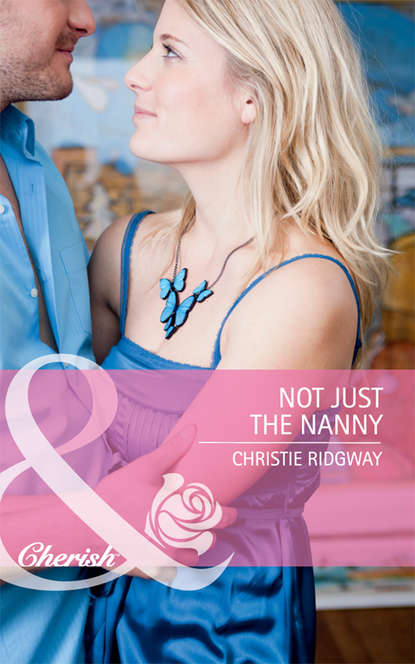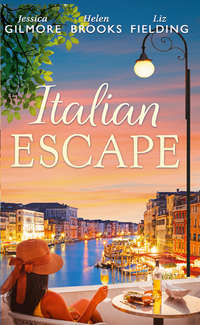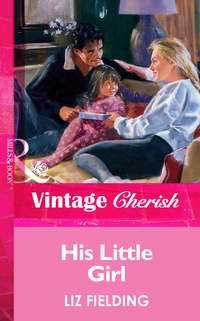
Полная версия
A Family of His Own

It almost broke her heart to see him making the effort for her, and she wanted to take his hand, put her arms around him and tell him that she understood. That one day it would be all right.
“Please, don’t feel like you have to laugh,” she said. “It isn’t in the least bit compulsory.”
“Okay.” And without warning, deep lines fanned out from his eyes and the smile became the real thing.
Kay had to catch her breath and force herself to concentrate on the job at hand. Dominic Ravenscar did it for her.
“What happened to your daughter’s father?”
The abrupt change of subject threw her, and she responded to this unexpected jab at a raw nerve in much the same way as he had. Instinctively. Defensively.
“Polly never had a father.”
Dear Reader,
Several of my books have touched on the lives of the inhabitants of Upper Haughton. Willow and Mike Armstrong from The Runaway Bride settled here. The Hilliards from A Perfect Proposal live in the Old Rectory. Jake and Amy Hallam, from my RITA®-nominated book, The Bachelor’s Baby, live here, too. They’ve moved out of Amy’s cottage and bought a larger house for their growing family, but Old Cottage isn’t empty. Kay Lovell—who works at the village shop, makes prize-winning marmalade and spends all her spare time helping out the neighbors—lives there with her daughter, Polly.
Linden Lodge, however, has stood empty for six years. The garden is running wild, the blackberries are tempting—and desperately needed for the village harvest supper—and the lock on the gate is broken. But Kay’s trespass doesn’t go unnoticed….
Upper Haughton is a real village; a place from my own childhood. I’ve only changed the name. Come and visit.
Warmest wishes,
Liz
A Family of His Own
Liz Fielding

MILLS & BOON
Before you start reading, why not sign up?
Thank you for downloading this Mills & Boon book. If you want to hear about exclusive discounts, special offers and competitions, sign up to our email newsletter today!
SIGN ME UP!
Or simply visit
signup.millsandboon.co.uk
Mills & Boon emails are completely free to receive and you can unsubscribe at any time via the link in any email we send you.
CONTENTS
PROLOGUE
CHAPTER ONE
CHAPTER TWO
CHAPTER THREE
CHAPTER FOUR
CHAPTER FIVE
CHAPTER SIX
CHAPTER SEVEN
CHAPTER EIGHT
CHAPTER NINE
CHAPTER TEN
PROLOGUE
‘SHE’S so beautiful, Jake.’ Amy Hallam gently touched the cheek of the newborn infant, then lifted her from the cradle and tucked her into the crook of her shoulder, breathing in the baby scent as she kissed the top of her downy head. ‘Her mother just left her on Aunt Lucy’s doorstep? The poor woman must have been distraught…’
‘Distraught maybe, but she knew Lucy would take care of her. She left a note.’ Jake handed his wife a sheet of paper and then took the baby from her so that she could read it.
Amy flinched as she touched the scrap of paper, physically sensing the emotional turmoil, the very real fear of the woman who’d written it.
‘Are you all right?’ Jake put out a hand to steady her.
‘Fine,’ she said, her mouth dry. But she sat down before she began to read.
Dear “Aunt Lucy”
You took care of me once and now I’m asking you to take care of my baby because there’s no one else I can turn to.
She was born on the 26th September. She has no name—if I don’t know her name I can’t betray her—and her birth has not been registered. She is totally anonymous. It is her only hope.
I’m begging you, trusting you, not to tell the authorities about her, not to make any appeals through the media for me to come forward. That will only draw attention to her, put her in danger.
I’m leaving what little money I have to help you until you can find some good people to take her in, give her a good life. I love her, but she isn’t safe with me.
K.
Amy blinked, focusing on the shimmering image of her own infant son as he scooted around on his bottom, irrationally wanting to grab him close, just to let him know how much she loved him. Instead she reached out wordlessly, and clasped her husband’s hand.
‘Paranoia? Domestic violence?’ he asked, trusting her instincts.
‘I don’t know, but this woman is terrified of something.’ Then, ‘You’ve only got to look at the handwriting,’ she said quickly as Jake quirked a brow at her, taken aback at her instant response. ‘Whatever the problem is, she’s beyond reason. She must know what she asks is impossible, that it breaks every childcare law in the book, but her only thought is to hide the baby.’
‘We can’t do that for long.’
‘No, of course not. But I’m not prepared to take any unnecessary risks. A week or two will make no difference.’
‘I’m not sure that the social services will see it that way.’
‘Maybe not, but if we could find her…’
‘She’s placed her infant in what she believes is a safe haven, Amy. Surely she’s going to put as much distance between them as she can?’
‘Not until she’s sure. She’ll stay close until she’s certain her baby is safe.’
‘How will that help? We have no idea what she looks like.’
She frowned. ‘Maybe we don’t need to. She’s left all her money with Lucy. She’ll be weak. Hungry. In a pretty bad way. We need to search the lanes around Lucy’s cottage, Jake. There’s no time to lose.’
CHAPTER ONE
“If reasons were as plentiful as blackberries…”
William Shakespeare
IT WAS hot for the end of September. A cloudless, still day with only the blackberries to warn that summer was almost over.
Huge glistening fruit that was infuriatingly out of reach.
Kay rubbed the sweat from her forehead, fanned herself with her tattered straw gardening hat and walked slowly back along the hedge, seeking out any that she’d missed, trying to ignore the long brambles lolling over the high wall that skirted the far side of the lane. Brambles weighed down by berries, but which still just evaded the reach of her walking stick.
‘Come on, Polly, this will have to do,’ she said, after scanning the hedge one last time.
‘Have you got enough?’ her daughter asked, looking doubtfully at the pitiful quantity they’d gathered.
‘There aren’t any more. I’m afraid the harvest-supper pies will have to be more apple than blackberry this year.’
Polly’s little face wrinkled up in a frown. ‘But there are loads up there,’ she said, pointing at the top of the wall.
‘I know, poppet, but I can’t reach them.’
‘You could get them down from the other side. Why don’t you go through the gate? No one lives there. Someone’s put up a For Sale sign,’ she added, as if that settled the matter.
How simple life was when you were six years old! But Polly was right about one thing. Linden Lodge had been empty for as long as she’d lived in Upper Haughton.
From her bedroom window she had tantalising glimpses of the wilderness hidden behind the high walls. The roof of an ornamental summer house collapsing beneath the unrestrained vigour of a Clematis montana. Roses running wild. Blossom on trees where, year after year, the ripened fruit had been left to fall and rot in the grass. It was like a secret garden from a fairy tale, locked away, hidden, sleeping. Just waiting for the right person to venture inside, bring it back to life.
It would take more than a kiss, she thought.
When she didn’t answer, Polly, with all the persistence of a six-year-old on a mission, said, ‘They’re for the harvest supper.’
‘What?’
Polly gave a huge sigh. ‘The blackberries, of course. Everyone in the village is supposed to give something.’
‘Oh, yes.’ That was the plan. Everyone contributed to the harvest supper that brought the whole village together in a celebration of the year; a tradition linking them back to the agricultural past of the village.
Her reluctance to try the gate was ridiculous, she knew. If she didn’t pick it the fruit would just shrivel up. Which would be a wicked waste.
‘You could put a note through the door to say thank you,’ Polly said.
Kay found herself smiling. ‘A thank-you note? Who to?’
‘Whoever buys the house. And I’ll draw a picture of the pies so that when they move in they’ll be happy that their blackberries didn’t go to waste,’ she said, tugging impatiently at her hand and leading her towards the gate. It wasn’t actually a gate, as such, but a gardener’s door set into the wall, the faded green paint cracking and peeling in the afternoon sun, neglected as the garden.
‘It’ll be locked,’ she said. Of course it would be locked.
Reason might suggest that she was doing the right thing but as she gripped the handle—her heart beating rather faster than normal—turned it and gave it a push, it still felt like trespassing. There was some initial resistance but then, just as she was about to back off with feelings that were a confused mixture of relief and disappointment, it shifted suddenly and flew back until it was stopped by the weeds.
A blackbird, pinking crossly at the disturbance, flew up out of the long grass, startling her, and she froze, half expecting to hear an angry voice demanding to know what the devil she thought she was doing.
It was just her conscience having its say.
Apart from the sound of her heartbeat hammering away in her ears, only the murmurous hum of bees busily working the vivid clumps of old-fashioned late-summer perennials, stockpiling their larders against the long winter, disturbed the silence.
Blue and purple Michaelmas daisies, Rudbeckia, Sedum. The tough species, survivors that could fight their corner against the rank weeds that had invaded the borders.
It cried out to her gardener’s heart to see someone’s hard work abandoned to the ravages of nature, and nothing could now have stopped her from putting her shoulder to the gate, forcing it back against the weeds and grass that had grown against it, to take a closer look.
Dominic Ravenscar turned his back on the drawing room, the ghostly shapes of furniture hidden beneath dust covers, and stared out at the neglected garden.
It was the moment he’d most dreaded, one he’d been running from for six years, this first sight of Sara’s garden. But no matter how hard he’d run, the demons had kept pace with him until he’d finally understood that there was no place far enough to escape the pain, no shadows deep enough to hide from his memories.
The last time he’d looked through the French windows it had been late spring. The fruit trees had been in blossom, the buds were thickening in the lilac, clumps of yellow tulips were spilling their petals over the grass and Sara had been blooming too with the glow of the new life they’d created. It had still been their secret, a private joy to be hugged to themselves for a while before they shared the news once the first uncertain weeks were safely past.
A double tragedy he had kept to himself, too. After her death it had been too late to share the joy and there had been pain enough to go around without making the aching loss even harder to bear for family and friends.
This vaster emptiness was his alone.
A lax stem from the rose she’d planted to grow “around the door” tapped against the French windows, startling him, forcing him to focus on the present. It wasn’t the only thing that had run wild.
Without Sara to tend it, care for it, nature had been quick to move in and take over. Shrubs were pressing towards the house, lank and overgrown, squeezing out the perennials that were fighting a losing battle for light and air. Weeds had colonised the cracks in the stone paving and grass had grown over the stepping-stone path that curved down beyond the summer house in the direction of the kitchen garden—even that was being crushed under the weight of some climber—while beyond it he glimpsed invasive brambles scrambling unchecked over the fruit trees she’d trained against the wall.
He rested his forehead against the warm glass, closed his eyes to shut out the wreck of his garden, the wreck of his life, but his mind wouldn’t let him rest. He’d bought the house because she’d fallen in love with this garden, enclosed as it was within high walls of old, rose-coloured brick. It would be a safe place, she’d said, for their children to play.
She’d become passionate about making an old-fashioned English garden, crammed with native plants that would attract butterflies and birds. In his mind’s eye he could see her now, ignoring the rain as she set about her roses with the secateurs, catch glimpses of her with her straw hat jammed on her head to protect her fair skin from the sun as she tied the young branches of the peach tree back against the far wall to enhance the kitchen garden.
Walking amongst the fruit trees of the small orchard she’d planted.
There was no escape from the pain in darkness and he opened his eyes. And still he saw her, pulling down the brambles as if admonishing his neglect…
‘Sara…’
His mouth moved but no sound emerged, only the thudding of his heart swelling and pounding in his throat. Then he was wrenching at the door, desperate to get to her. It refused to budge and it took a moment for him to realise that it was locked, that the keys were on the kitchen table where he’d thrown them. Out of reach. Because he dared not move, dared not turn away for a second. If he took his eyes off her she’d disappear…
Instead he hammered desperately at the glass with his bunched fists, wanting her to turn around and look at him.
If she looked, if she saw him too, everything would be all right…
‘Sara!’
‘Dom, are you OK?’
Momentarily distracted, he blinked, half turned…and when he looked back she’d gone.
‘Dom?’
At first it had happened all the time. Everywhere he’d looked he’d thought he saw her. A glimpse of long, sun-streaked blonde hair in a crowd, a ripple of laughter in a restaurant, a flash of her favourite colour had been enough to stop his heart. It had been a long time since the experience had been so vivid, so real…
Since it had left him feeling quite so bleak. Quite so alone.
‘I’m fine, Greg,’ he said abruptly, turning away from the window and realising that he was the object of very real concern. It was an expression he’d come to know well in the months after Sara’s death. One of the reasons he’d gone away, choosing to keep on the move, live and work amongst strangers who didn’t know anything about him. Didn’t know what had happened. People who didn’t have to hunt for words because they didn’t know what to say. People who, after their initial friendly overtures were rejected, backed off and kept their distance. ‘I’m fine.’
‘There’s no need to put yourself through this, you know,’ Greg said, putting down the box of groceries he’d fetched from the car. ‘You could leave everything to me. Just tell me what you want to keep and I’ll get it packed up, put in store for you until you…well, until you need it.’ Then, more brightly, ‘It won’t take long to sell the house. You could sell a garden shed in Upper Haughton. It was an astute investment…’
‘I didn’t buy it as an investment. I bought it because—’
‘I know,’ he cut in quickly. ‘I’m sorry.’
He shook his head. He knew Greg was just talking to fill the silence.
‘Look, why don’t you just come and stay with us until it’s sorted?’
‘No.’ Then, perceiving that he had been abrupt, knowing that Greg deserved better, he said, ‘Thank you, but there are things I need to go through. I should have done it a long time ago.’ He turned back to the window, hoping against hope that she’d be there again, but the garden was empty.
‘Right.’ There was a pause, then, following his glance out of the window, ‘Do you need some help to sort through…things? It doesn’t have to be anyone you know. I could ask the agency who supplies us with staff if they have someone. It might be easier with someone who isn’t emotionally, well, you know…’
He knew, but he didn’t want help. He didn’t want anyone. He just wanted Greg to stop looking at him as if he was losing it and instead go away and leave him alone. But the man wasn’t just his lawyer, he was the friend who’d stood at his side as he promised to be faithful to Sara until death parted them. Meaningless words. They were young. In love. They were going to live forever…
‘Thank you, Greg,’ he said, taking pity on him, knowing that he just wanted to help but didn’t know how, impotent in the face of such unimaginable grief. ‘Can I let you know?’
‘Of course.’ Then, ‘Are you sure you’re going to be all right here?’ he said, looking around. ‘If you’d given me a bit of warning, I could have got someone in to give the place a thorough going over. Your once-a-month people haven’t been doing more than the minimum by the looks of things.’
‘That’s all I paid them to do.’ The minimum. He’d told them not to disturb anything. ‘I’ve got water and power. A cellphone. It’s all I need.’
‘What about some transport?’
‘I’m not going anywhere.’
‘Right,’ he said after a long pause, during which he’d clearly debated whether it would be safe to leave him. ‘I’ll be off, then.’ Receiving no encouragement to stay, he continued, ‘If you’re sure? That box of groceries is pretty basic.’
‘Don’t worry. I’ve managed to keep body and soul together for six years. I’m not about to starve myself to death.’
Greg looked as if he was about to say something, but thought better of it. He didn’t need to say anything. Dom had seen the shocked look he hadn’t been quite swift enough to hide when he’d picked him up at the airport.
He turned back to look once more at the garden and his heart lifted a beat. She was there again, her hat shading her face as she looked around as if seeking something she’d lost. Tall, slender in a pair of baggy denim jeans, a faded turquoise T-shirt. It had always been her favourite colour.
‘I’ll call you tomorrow,’ Greg said from the door. ‘We’ll talk about some help.’
‘No rush,’ he said absently, willing her to look up—look at him. Then he was distracted by another movement as a little girl leapt up out of the grass, holding up a loop of flowers. A daisy chain of some kind. Sara put it on the child’s head so that she looked like a little princess.
He was sure she was laughing. If only he could see her face.
‘No rush…’ he said again as the door clicked shut. Hands pressed against the glass, he watched as, having bent to kiss the child, she reached into her back pocket, took out a pair of secateurs and reached down to cut through the thick stem of the brambles. ‘I’ve got all the time in the world.’
Then he saw that she wasn’t wearing gloves.
He’d bought her a pair, but she always tore them off, impatient with her clumsiness in the thick, thorn-proof protection.
As he watched, a bramble whipped back and caught her hand.
‘No…’
She eased it carefully from her skin, then put her thumb to her mouth, sucked it, and, like a recurring nightmare, history began to repeat itself…
‘Sara…’
But her name choked in his throat and he slid down the glass as the image shimmered, then shattered as he slammed his lids shut.
‘Heavens, Kay, you’ve done well.’ Amy Hallam placed a bowl with a few blackberries in it on the kitchen table. ‘I thought I’d help out, but there really isn’t much fruit in our paddock. The goat nibbles any bramble shoots the minute they appear.’
‘Goats eat anything the minute it appears above ground.’ Kay rinsed the fruit and added it to the pan simmering on the stove. ‘But thanks for the thought. I’m afraid I had to do something rather bad to ensure that the blackberry and apple pies weren’t just apple this year.’
‘Bad? You? How unexpected.’ She grinned. ‘How promising.’
‘Stop it. I’m serious. I raided the garden at Linden Lodge. Egged on, I have to tell you, by your god-daughter.’
‘What’s bad about that? It would have been a crime to let them go to waste. Polly’s a bright child and I’ve done my godmotherly duty in teaching her to use her initiative.’
‘The resident blackbird didn’t take your relaxed view—’
‘Let him eat worms.’
‘—and I broke the latch on the gate when I pushed it open.’
‘Scrumping and vandalism in one fell swoop,’ Amy said with a grin. ‘You’re a one-woman crime wave, Kay Lovell. The neighbourhood-watch coordinator will have to be informed. Oh, wait. You are the neighbourhood-watch coordinator—’
‘Oh, stop it,’ Kay said, unable to suppress her answering grin. Then, picking up the kettle, ‘Coffee?’
‘Please. Do you want me to send someone over to fix the gate?’
‘No, I can handle it. The bit that the bolt slides into had rusted away, that’s all. I’m sure I’ve got one in the shed.’
‘What’s it like in there?’
‘The shed? Do you want to do a landlady’s inspection now? I really should have some notice so that I can tidy up a bit…’
‘Linden Lodge.’
Yes, well, she knew that was what Amy meant. She wasn’t sure she wanted to talk about it though.
‘It’s so mysterious behind those high walls,’ Amy prompted.
‘No, just overgrown,’ Kay said. ‘Polly sat down to make a Michaelmas-daisy chain while I cut back the brambles and she completely disappeared. Just for a minute I thought…’ She let it go. She didn’t want to remember how she’d felt in those few horrible seconds when Polly had failed to respond to her call. When all she could see was the open gate and a million hideous possibilities had rushed into her head…
‘You cut back the brambles?’ Amy asked, distracting her.
‘What? Oh, well, yes. They were strangling an espaliered peach. Poor thing.’ She concentrated on spooning coffee into the cafetière. ‘Don’t snigger, Amy.’
‘Me? Snigger? Perish the thought.’
‘Well, don’t smile, then. I know it was pathetic of me. I just can’t bear to see anything suffering.’ She stopped, turned away to take down a couple of mugs. She knew she didn’t have to explain. Amy never needed explanations. She just seemed to know. ‘Anyway,’ she said, ‘I’ll drop a note through the letterbox tomorrow when I go and fix the gate. Just to explain.’
‘About cutting back the brambles to save the peach tree?’
‘About nicking the blackberries. For a good cause.’
‘There’s no one at home to care and ghosts don’t need explanations, Kay.’
Startled, she turned to look at her visitor. ‘Ghosts?’
‘You didn’t feel it? The garden always feels haunted to me whenever I walk past.’
‘No. It wasn’t creepy, just…sad.’
‘Maybe that’s what I meant.’
Kay didn’t think so. She hadn’t felt any ghosts there, but Amy was well known locally for her slightly fey qualities, her ability to feel more than most people could see.
‘A For Sale board went up on Friday. Did you know?’ she said, determined to change the subject. She hadn’t felt anything beyond sadness, yet even now her skin was goosing. And she had to go back there to fix the gate.
‘I heard it was on the market. Such a pity.’
‘Did you know the people who lived there?’
‘The Ravenscars? Not well. We’d met at village events, of course—the fête, a fundraiser for the hall, that sort of thing—but I was busy with the children. I had Mark that year and I was still establishing the business. They were younger, hadn’t been married more than a year or two and were still more interested in each other than anyone else. They came to the harvest supper, though. I remember Sara Ravenscar was thrilled at the way the whole village comes together for that. She’d have approved of you having the blackberries.’ Then, ‘Her death was such a tragedy.’












